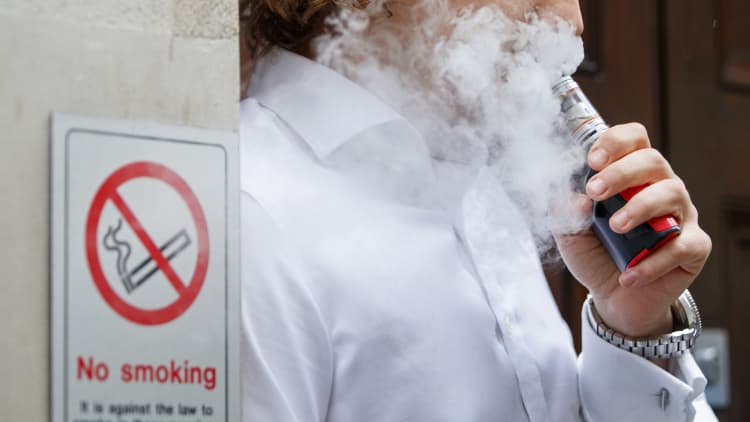The American Academy of Pediatrics on Tuesday slammed e-cigarette maker Juul in written congressional testimony, saying the salts it uses in its vaping devices help deliver "dramatically higher levels" of nicotine to the brain than other products.
"Adolescents simply do not stand a chance," pediatrician Dr. Susanne E. Tanski said in remarks prepared for delivery at a hearing scheduled Wednesday before a House Energy and Commerce subcommittee. The House Appropriations Committee has also scheduled a hearing looking into the safety of e-cigarettes at about the same time.

Juul executives, who didn't immediately respond to CNBC's request for comment on Tanski's remarks, have previously said its nicotine salts give users an experience similar to conventional cigarettes that helps smokers quit. But public health officials, including those at the Centers for Disease Control and Prevention, worry about the effects of nicotine salts on the developing brain in young people.
Tanski, a Dartmouth pediatrics professor representing the American Academy of Pediatrics, said nicotine is a psychoactive drug that is well known for its high level of toxicity. Nicotine dependence impacts areas of the brain that control executive function, memory and mood, Tanski said. At low doses it acts as a stimulant, leading to a feeling of pleasure, she added.
"Very simply, at the level of the brain, nicotine works within the reward pathways," Tanski said in the prepared remarks.
Tanski said young patients in her practice often describe high levels of dependence on the popular e-cigarette brand, noting that they use it immediately upon waking up in the morning.
"Recently, a colleague asked me if I had heard of teens getting up in the middle of the night to vape," she said. "I had not, but I quickly learned that this was simply because I had not been asking the right questions."
Tanski also criticized Juul for their advertisements of a variety of fruity-flavored e-cigarettes, saying "the appeal of flavors for children is well understood by e-cigarette manufacturers."
"The flavors also help mask the harsh taste of nicotine, making repeated use more likely, and thereby increasing the likelihood of developing addiction," she said.

Juul, which came under pressure over the last year for allegedly marketing to underage kids, is now caught in a public health crisis following hundreds of illnesses and more than a dozen deaths from a mysterious lung illness linked to vaping.
The CDC has dispatched more than 100 physicians and investigators since the lung disease started to emerge as a public health threat in July. Meanwhile, Congress and other agencies are conducting their own probes into the e-cigarette industry and market leader Juul.


